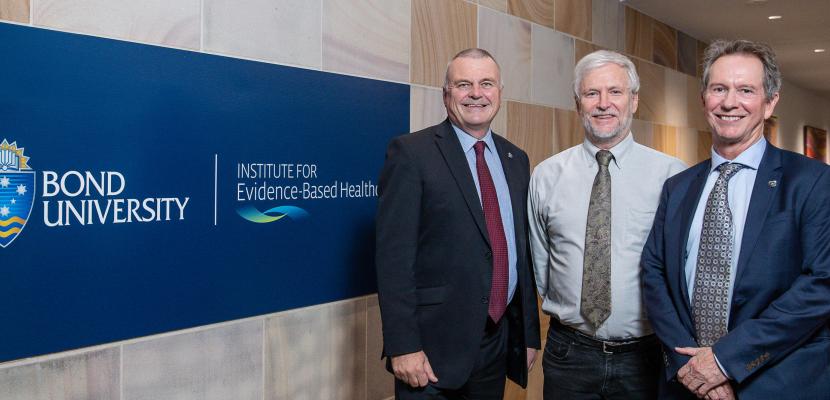
Bond University has launched its Institute for Evidence-Based Healthcare to heighten its impact and influence on the global health sector.
The University’s Centre for Research and Evidence-Based Practice (CREBP) was initially founded in July 2010. Since this time, it has grown and matured into a highly-influential and internationally-renowned research centre and thought-leader in the realm of evidence-based practice.
Over the past nine years, CREBP attracted in excess of $25 million in external funding, conducted world-first research and instigated industry-wide reforms and alliances that had significant and wide-reaching national and global impact. In the past five years alone, the CREBP team has published more than 400 peer-reviewed articles in some of the top international journals including The Lancet, JAMA, BMJ and PLOS One.
According to the Director of the Institute for Evidence-Based Healthcare (IEBH), Professor Paul Glasziou, the Institute will build on the solid foundation laid by CREBP over the past decade.
“The shift to become an Institute will take us to the next level in terms of our ability to impact and influence the global healthcare sector, form national and international partnerships, translate research findings into clinical care best-practice, and develop and deliver unique new education programs,” he said.
“Our ultimate vision is for a sustainable health system where patients, families and clinicians make fully-informed choices based on the best available evidence.”
The Institute will continue to conduct world-class research focusing in four high impact areas:
- Antibiotic resistance
- Overdiagnosis
- Non-pharmaceutical treatments, and
- Waste in medical research.
“We’ll continue to work on the big neglected problems we currently research nationally and globally, but with a view to achieving a greater external impact in these four key areas,” Professor Glasziou said.
“The Institute will serve as a national and international resource for researchers, scholars, clinicians, healthcare workers, patients and their families in the application of best-practice evidence-based clinical care and knowledge.
“We will also focus on broadening our engagement and education arms.”
In recent years CREBP’s workshop program has grown in popularity, diversity and reach.
In response to this increased demand for information and education on evidence-based approaches and systematic reviews from healthcare professionals, clinicians, researchers and broader health systems and districts – the Institute will deliver more and different workshops across regional and metropolitan Australia.
The Master of Healthcare Innovations program which Bond University’s Faculty of Health Sciences & Medicine is offering from September 2019 is closely aligned to the new Institute, with the IEBH team responsible for developing and delivering a large component of its unique content - particularly in the areas of evidence-based practice and healthcare sustainability.
“Our education and engagement programs will introduce participants to evidence-based approaches and systematic reviews – which are two specialist areas for the Institute,” Professor Glasziou said.
Systematic reviews summarise the results of available healthcare studies (controlled trials) and provide a high level of evidence on the effectiveness of healthcare interventions, which is then assessed with a view to making informed recommendations for healthcare.
CREBP is registered with the National Health & Medical Research Council (NHMRC) as an accredited supplier of systematic reviews and has provided reviews for a number of high-profile national and international healthcare organisations including the National Heart Foundation of Australia and the World Health Organization (WHO).
“The Institute will develop closer working relationships and engage more heavily with important players in the healthcare sector at a local, national and global level,” Professor Glasziou said.
“For example, we are currently working on our seventh Preventing Overdiagnosis international Conference taking place in Sydney this year – an event initiated by CREBP in 2013 – and the event’s associate partners include a large number of major professional colleges, the Royal Australian College of General Practitioners, Royal Australasian College of Physicians, Consumers Health Forum, the Cancer Council of Australia and Cochrane Australia - with the World Health Organization coming on board this year as event co-sponsor.”
The interdisciplinary, multicultural IEBH team is comprised of 36 academic, teaching and support staff from more than 10 countries including Canada, the UK, Columbia, Switzerland, Denmark, Indonesia, Sri Lanka, Mongolia and Egypt. The team works closely with several Australian Universities and other organisations and collaborates with dozens of organisations globally.
Bond University’s Executive Dean of the Faculty of Health Sciences and Medicine, Professor Nick Zwar said the evolution of CREBP into the Institute for Evidence-Based Healthcare would further enhance its capacity and impact.
“Priorities in the national healthcare environment are shifting towards efficiency in research and the translation and integration of research outcomes into everyday practice,” Professor Zwar said.
“The Institute is perfectly positioned to respond to these priorities and in doing so contribute to the health and healthcare of Australians, influence health policy and improve global health outcomes.
“Bond University and the Faculty of Health Sciences and Medicine are extremely proud of the achievements of Professor Glasziou and the CREBP team and excited by the future opportunities that will be realised by the Institute of Evidence-Based Healthcare.”
As part of its 30th Anniversary celebrations, last month Bond University officially launched the Stage 2 expansion of its Health Sciences & Medicine building, which included more space and new facilities for the Institute for Evidence-Based Healthcare to connect and collaborate with students from across the University and members of the broader Gold Coast health community.